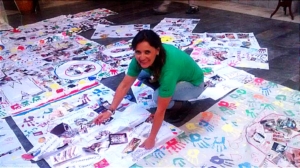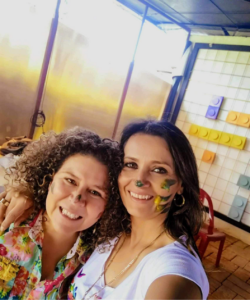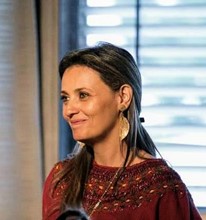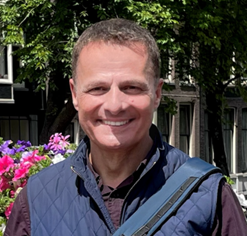
We Are Still on The Road, Talking About Summits
It was the year 2014. I was working with my brothers in their training company, which was quite large, very well established, and well known in the Ecuadorian market. An important multinational organization contacted us to assist them with organizing a worldwide Appreciative Inquiry Summit for its headquarters in all the countries it operated in. It was the first time I heard of an “Appreciative Inquiry Summit”. Though partly due to being a psychologist by profession, trained in many methodologies, including Human Talent, I didn’t know about Appreciative Inquiry. I am curious by nature, so I decided to investigate it further. I would have liked to play an active part in the summit in my country, but they looked for professionals from other countries for support.
Lorena Merino Naranjo | Ecuador
Lorena Merino Naranjo is a dedicated psychologist with fifteen years of experience in a hospital setting, fulfilling her lifelong aspiration. A mother to three wonderful sons, and journeying without time and space with her partner, she is passionate about her profession and consistently seeks to innovate and grow in her role as she continues to discover, dream, design and live appreciatively.
Going back to school: The fundamentals of Appreciative Inquiry

One of my brothers, Mauricio, also a crazy dreamer like me, saw how excited I was about the course I explained the ways in which what I had experienced and learned could be used in the work we already did by bringing in the concepts of AI, and that we could use our new understanding to help others find similar paths. Armed with these new ideas, we approached various Ecuadorian groups who we felt might be interested: producers and exporters of roses, public and municipal companies, and those in El Caquetá, a region of great natural beauty in Colombia.
Our first intervention: Living with guerilla activity

Our commitment was to life: what we were dreaming of would affect the lives of many and we had to look at the ‘whole life’ situation. I already knew what I wanted my way of life to be. The process of writing also brought about greater understanding of life choices. The dreaming helped me to crystallise my thoughts of how my own journey could be used as a basis to help others by explaining how they could use something that had changed my life to do the same. This meant writing about AI psycho-therapeutically, about the discovering of what exists and what works well, including looking at everything that had left a mark on me and, what I had learned from it. This brought home to me even more clearly just how amazing the effect of the AI approach was having on me as an individual. Using an AI approach, listening to others and listening to myself, let everything begin to make sense – how our experiences could be used in co-designing ways forward.

María José Barona and I worked on the design of a psychotherapeutic methodological proposal which we call “person-oriented, humanistic, appreciative psychotherapy”.
A humanist, person-centered perspective
The psychotherapeutic approach we use focuses on the humanistic person-centered perspective in the here-and-now, where we consider the person in a bio-psychosocial-spiritual way, respecting their uniqueness, their unrepeatable, irreplaceable being. We look beyond the symptoms and diagnosis: as our approach focuses on the person’s welfare in which unconditional acceptance, transparency, the principle of free choice and the search for real solutions from a non-directive approach prevail. We connect the outcomes of our summit dreaming, with using AI, to what we have been supporting in private practice and clinical intervention for approximately ten years. We’ve done this in such a way that the view of mental health in our country has now shifted to one that sees the positive aspects of people receiving therapy.
The patient who turns for help to a consultation does so from a position of crisis or vulnerability, or a driving need for transformation. Most arrive feeling that they are lacking something and, unable to see what to do alone, seek help. The results, which are clear, include:
- Children who have found meaning in living after serious accidents,
- Women who have overcome abandonment, abuse and loneliness to become the protagonists of their dreams,
- Men with diagnoses of diseases that can’t be treated, choosing to take charge of their life history,
- Couples who have reunited from the essence, the very core, of who they are to design stronger families together,
- Young people who can look in the mirror to discover that they can choose to be the makers of their lives with powerful images that move them to change their here-and-now forever.
The process begins with the idea of the person recognizing the peak moments in their history, knowing themselves to be the author of those moments . This is where resilient resources are awakened, the key and the positive core of the whole process which lets them go beyond the self-doubts to see a positive way forward.
In undertaking this journey through personal history and the resources present in the person’s four intertwined dimensions, best described as the bio-psychosocial-spiritual self, we begin to see the appreciative path as one that the individual concerned and I take together. However, I strongly believe that this will only be fruitful if I, as the facilitator, have looked at, recognized and valued myself in the same way as I am asking the individual to do. Only then can I dream a new outlook and see myself as if it were already happening, in every detail. I design myself to the measure of what I am, and I dream. Destiny is the moment in which I choose to walk, to live this dream.
When you look at yourself appreciatively, you admire the world, and the people who come to you are appreciative, so the path also becomes appreciative.
The continuing path of learning
The path of learning, application, experience, debate and transformation continues: Chile 2014 Fundamentals of AI; Colombia 2015 Caquetá Summit; Lima 2015 Appreciative Coaching; Ecuador 2015 Appreciative Leadership; Mexico 2016 Contagiando la AI; Buenos Aires 2016 Advanced AI; Ecuador 2017 First Edition Discover yourself MujerIA; Rosario 2018 Second Edition MujerIA. In Nice, in 2019 at WAIC (the World Appreciative Inquiry Congress), we were part of the Latin American group Unity Towards the Common Good. From 2020 to the present, many communities, companies, families and patients in Ecuador and Latin America have benefited from a change of outlook, an appreciative transformation of their lives.
Thanks to each one of those brilliant professionals, who have accompanied me and continue to do so, in this work that bears fruit, work that builds ideas that become a reality, because they do it with their soul in their hands! The voice of each one of the people we work with is present in each step taken! Thank you, Miriam Subirana, for teaching me and for trusting me.
Thank you, David Cooperrider, for dreaming, creating and designing an appreciative world, for leaving the written lines and inviting us to keep editing them every day!
We are still on the road, talking about summits.
Intro by Keith Storace
In Voices from the Field, Lorena Merino Naranjo recounts her transformative journey with Appreciative Inquiry. In her article titled “We Are Still on The Road, Talking About Summits”, Lorena presents how she collaborated with María José Barona to integrate Appreciative Inquiry into a psychotherapeutic approach that leverages personal strengths, achieving significant positive outcomes for patients and communities across Latin America. Her ongoing commitment to personcentred and strengths-based therapy is reflective of the extent to which people have benefited from such a unique approach to therapy.




Very descriptive article, I liked that a lot.
Will there be a part 2?